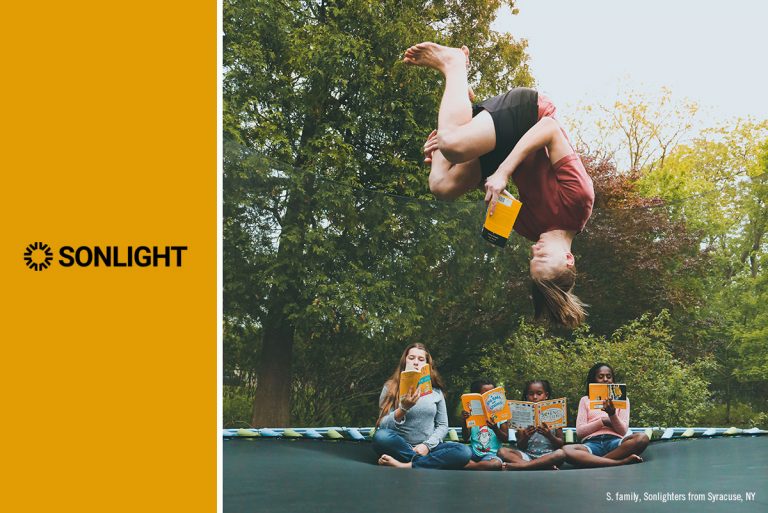
Siblings Micah (17), Caia (14,), Hanna (11), Kidist (8), and Mihiret (5), enjoy Sonlight books together on the trampoline.
Are you feeling out of sorts as you homeschool during this 2020 coronavirus pandemic? Me too! None of us has ever done this before, and it’s unsettling.
- We are advised not to take our children to the grocery store.
- People we know (maybe ourselves) are out of work.
- Homeschool co-op is canceled, and a friend’s birthday became a drive-by parade instead of a traditional party.
- There is a deep feeling of loss each time church fails to gather in person, opting instead for the safety of a televised service.
Jokes abound that homeschoolers are fine since we already have our kids out of school and are used to staying home. This hurts too.
While, yes, homeschoolers aren't dependent on schools, almost all of us have had our homeschool routine disrupted in some way. Our co-ops have been cancelled. Playdates are put on hold. And our favorite field trip spots aren't open. Plus the sheer weight of living during a pandemic affects us, too!
The Homeschool Family in Quarantine
So how do we persevere and safeguard our homeschool during a pandemic?
First we acknowledge that things have changed. We realize that there is fear and uncertainty, and that we, too, are uncomfortable. Recognize the losses and the grief. Feel those emotions fully.
Second we give ourselves permission to take a break. When coping with a loss or adjusting to a big change, one of the best things we can do for ourselves and for our families is to build in space to grieve, reflect, and pray. Some families may want to temporarily press pause on homeschool lessons.
Finally we come up with a new normal. Homeschooling is going to look and feel different, but we are in a great position to make the best use of our time together at home to connect as a family. As Sonlight homeschoolers we already connect through stories, games, and experiences. We can do this!
While some families may want to take a break, other families may want to invest more energy into their books since it provides a sense of safety and routine. Do what feels best for your bunch whether that's whizzing through your Instructor's Guide thanks to all your extra time at home during quarantine or whether that's putting the academics aside for a few days while you enjoy cozy family time. The longer quarantine lasts, the more options you have for both scenarios — times of rest and times of in-depth schoolwork!
1. Talk with Your Children
Acknowledge that things aren’t the way they used to be. Give voice to the things that have changed. Let them know that you are aware of how different life feels right now. Give them labels and words to describe what’s going on in the world.
- Define pandemic.
- Look up some age-appropriate material on Covid-19.
- Talk more about germs and viruses.
- Consider vocabulary they may have overhead such as ventilator or PPE.
- Ask them about their concerns and let them know you are there to help answer or find answers to their questions.
- Combat fear with knowledge and understanding. Social distancing feels better when you understand its purpose.
2. Be Ready to Listen
Prepare yourself for a lot of big feelings.
Just like us, our kids are experiencing something that has never happened in their lifetime. Children struggling to find the words to share their experience may lash out in frustration or complain about the social distancing. Be there for your kids with an extra dose of patience.
3. Limit Exposure
This is big news! Coverage is constant and overwhelming. Turn off the screens and news podcasts to reduce the noise when it all starts to feel heavy (for you and for the kids).
4. Set an Example
Let your children see you engaging in self-care. Keep exercising. Keep reading. Keep learning with and loving your family!
5. Offer Reassurance
Remind your children that you are their parent and you will do everything you can to keep them safe. For younger kids a little reassurance may be all they need. For older kids, take the time to explain the actions you are taking to protect the family such as working from home, social distancing, dropping off groceries for older family members, or showering when returning home.
6. Support
Be open to extending and receiving support. If you are in a position of emotional, physical, and financial stability, consider offering to help others. Deliver groceries or lend an ear.
Respect your limits, and if you need help, ask!
Christ remains the center of our families and our homeschools. He is with us during the ordinary days and the extraordinary ones. He will carry us through Covid-19.








